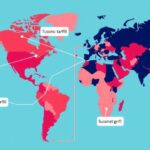India Prepares for Impact of U.S. Tariffs by Assessing Export Barriers
India is preparing for potential U.S. tariffs by assessing various scenarios and engaging domestic industries on non-tariff barriers. President Trump has indicated that India will significantly reduce its tariffs. A portal for addressing non-tariff barriers will be launched to assist exporters in resolving issues that impede trade with the U.S.
The Indian government is strategizing in response to potential tariffs imposed by the Trump administration. The Ministry of Commerce is engaging with domestic industries regarding various non-tariff barriers that affect their exports to the United States. An official noted, “The impact of these tariffs may vary across sectors and countries. An exercise is on to prepare different scenarios,” underscoring the uncertainty surrounding the anticipated duties.
Consultancy firm PWC has indicated that the U.S. may evaluate reciprocal tariffs based on five criteria: existing tariffs on American goods, internal tax systems, non-tariff barriers, regulatory burdens, currency policies, and other trade practices regarded as unfair by the USTR. This analysis emphasizes the diverse factors influencing tariff decisions.
President Trump stated that India would “be dropping its tariffs very substantially” as he prepares to announce reciprocal tariffs on various countries on April 2, which he has designated as Liberation Day. He expressed confidence that many nations will reduce their tariffs due to perceived unfair practices, noting that the European Union has already lowered car tariffs to 2.5%.
In separate efforts, the Ministry is collecting feedback from the Indian industry on non-tariff barriers hindering exports to the U.S. A new portal will be launched within two months for exporters to register these challenges. An official highlighted that, “One of the sections of the platform will be opened for the public. Cases where the barrier is impacting a large volume of goods will be prioritised for their redressal,” aiming to address significant impediments faced by exporters.
Specific non-tariff barriers include the U.S. prohibition on the export of wild-caught shrimp from India due to concerns over the usage of Turtle Excluder Devices by Indian trawlers, as well as other private standards imposed by American businesses.
In conclusion, the Indian government is proactively developing strategies to mitigate the impact of potential U.S. tariffs, focusing on both tariff and non-tariff barriers affecting local exporters. The introduction of a feedback platform aims to streamline the identification and resolution of these barriers, enhancing India’s competitive edge in international trade.
Original Source: m.economictimes.com








Post Comment